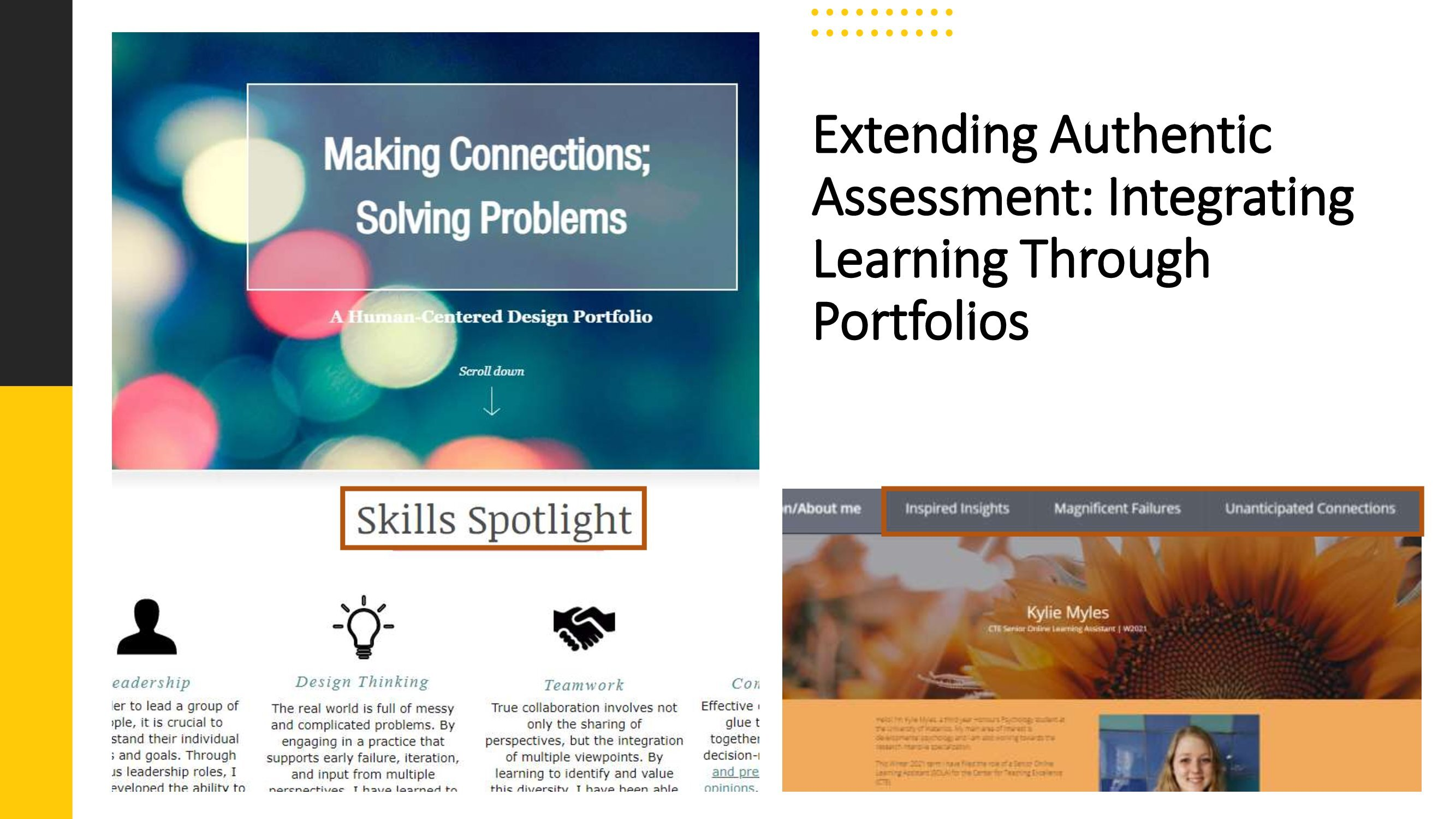The ePortfolios linked below are creative, fun, and effective.
Although they use different approaches (and different platforms), they are alike in embodying the student's reflections on their learning while at the same time showcasing their achievements.
Listen to a student's perspective! Kylie Myles, an Honours Psychology student and former CTE coop student, shares her experience using an ePortfolio (below) for reflection.

ePortfolio Integration Strategies
Advice for integrating ePortfolios into courses, programs, and co/extra-curricular activities
ePortfolios are for more than coop students!
See how a Master of Public Health Student’s ePortfolio has been developed in the years after graduation.
More Examples
Course Related Student Portfolios
HIST 262: Early Modern Europe 1450-1700
In Greta Kroeker’s HIST 262 course, students explored the Early Modern Period in Europe between roughly 1450 and 1750. PebblePad supported the students’ learning journeys throughout the course. To support writing development, students completed three separate short writing assignments using PebblePad templates. Feedback provided to the assignments could be used to improve subsequent assignments. For the final project, each student created a portfolio to demonstrate the findings of their research related to an artifact relevant to Early Modern Europe.
- Demonstrating Research Finding in a Portfolio: Cassandra Sevigny - The Industrialization of Fiber Arts and its Implications on Early Modern Women
HIST/GSJ 347: Witches, Wives and Whores
The capstone project for HIST/GSJ 347 is the creation of an exhibition project. Examples of entries for part of the exhibition might include bibliographies, articles, biographical information on important figures, images, drawings, recipes, journal portions, and primary sources like plays or diaries. If a student is artistic or creative, they may choose to include objects they make or create. All items will be the result of primary and secondary research. All items must be presented in a way that reflects the item’s historical significance and based on solid research complete with citations. All materials need to be properly cited and marked with your full name in the upper right corner and loaded onto your group Learn page in digital form in order to share with the whole class, even if your projects involve the creation of physical items.
- Lauren Simmons portfolio - The Queen of Drama: Queen Elizabeth 1 non-stop train of scandal, rumours, and enemies since her accessions to the throne.
- Cassandra Sevigny - Grainne Ni Mhaille: Irish Pirate Queen and the Meeting with Elizabeth 1.
HLTH 474: Health Apprenticeship
This example illustrates how a student used the Student Led Individually Created Course (SLICC) self-directed learning framework to document their growth and development while working on their chosen project, “Validation and Testing the Clinician-reported Genetic testing Utility InDEx (C-GUIDE)TM in Neonatal Intensive Care)”.
HLTH 480: Competencies in Health
Reflecting on competencies, articulating transferable skills, and showcasing achievements. Examples of student portfolios from the HLTH 480 class (shared with students’ permission):
-
Konstantinos has continued to update his portfolio to share with prospective employers
HLTH 602B:
This course is the culminating course for students completing the Master of Public Health Program and the ‘capstone project’ is the primary component of the course. For the project, students organize into self-formed groups. Working with a community partner, each group is required to complete a project addressing a particular public health issue. This can take the form of a program proposal, evaluation plan, policy brief, an in-depth analysis of a public health problem, or other products aiming to advance public health practice in a particular area or topic. The various stages of the project are captured and showcased in a group ePortfolio.
Reflecting on Co-op Experiences
- Clara’s portfolio. Clara Shao, a student, shares her experience returning to CTE for a second co-op work term when she was a third year ARBUS legal studies student. Under the categories of ‘Inspired Insights, Magnificent Failures and Unanticipated Connections, Clara highlights what she learned while working at the Centre for Teaching Excellence and how that will help her in the future.
- Amy’s ePortfolio. Amy Chonko, a third-year Arts and Business Psychology student, shares her Fall 2025 co-op experience as a Special Projects Assistant at the Centre for Teaching Excellence. Her reflections explore learning and growth through three themes: Inspired Insights, Magnificent Failures, and Unanticipated Connections.
- Gwyneth’s ePortfolio. Gwyneth Davies, a Geography student, highlights her new experiences while working at the Centre for Teaching Excellence. Her portfolio examines the different projects, connections and failures they were able to make during her time here.
- Luxman's co-op experience. A 3rd Year Environment and Business student reflecting on their first in-person co-op experience at the Centre for Teaching Excellence. His portfolio showcases different skills and connections they made during the term.
- Katie’s first co-op experience. Her portfolio showcases what she learned about the ways in which educational policy and development is implemented in real life academic settings and how she was able to advance her skills in information & data literacy, research, analysis, teaching and oral communication.
- Eleanor's co-op experience. Eleanor Walby, a Psychology student, reflects on projects she worked on during her co-op term and finds connections between her time at CTE and her academic studies.
- A glimpse into Lauryn's semester as a co-op student. Lauryn Quinn, a Science student, discusses her newfound survey, scheduling, spreadsheet, and speaking skills, earned through working at CTE.
- Charley reflects on their co-op experience. Charley Potter, a Psychology student, examines the insights, failures, and connections they experienced while working at CTE. They had the opportunity to spend more than one co-op term with CTE. See their culminating ePortfolio.
- Aya Bibi's First Co-op Experience. Introduces the perspective of an Arts and Business student in their first co-op placement at CTE.
- Sarah examines her return to CTE as a co-op student. Sarah Seabrook examines the skills developed and benefits of returning to CTE over three work terms.
- Ginny Wong's First Co-op Experience. Introduces the perspective of an Environment student in their first co-op placement at CTE.
- Komal Gill's First Co-op Experience. Introduces the perspective of a Fine Arts and Psychology student in their first co-op placement at CTE.
- Mariam Mazen's First Co-op Experience. Introduces the perspective of a Honours Psychology student in their first co-op placement at CTE.
- Matt Yueng's First Co-op Experience. Introduces the perspective of a Honours Psychology student in their first co-op placement at CTE.
- Kylie examines the significance of the workplace environment. Kylie Myles explains the importance of social interaction and the opportunities for getting to know CTE staff members.
- Lara reflects on her co-op experience. Lara Barnum, a Biochemistry student, examines connections, insights and lessons learned during the co-op work term.
- Stephanie's reflection on her co-op experience. Stephanie Hand, an Environment student, examines opportunities, projects and skills developed during the co-op work term.
Skill Development/Transferable Skills
- Cultivating Portable Skills - Clara Shao, a Legal Studies student, illustrates her skills development and newfound connections during her co-op experience in her ePortfolio.
- Charlie’s co-op experience - Using the headings ‘Inspired Insights’, ‘Magnificent Failures’, and ‘Unanticipated Connections’, Charlie Uebele, a third year Environment and Business student, highlights the skills he developed and shares his co-op experience in his ePortfolio.
- Transferable Skill Development - Sarah Abdelrahman, a Biology student, reflects on experiences, skills developed, and lessons learned that will be useful in the future.
- Developing Transferable Skills - Rachel Lam, a Psychology student, discusses finding links between academic knowledge and life experiences, and discovering new skills and interests.
- Developing Transferable skills - Brent McCready Branch, a Health Sciences student, reflects on lessons learned, and the importance of connections.
- Skills Development - Chloe Chan, a Biotechnology student, highlights a variety of skills developed such as research and design skills.
- Problem Solving - Nicole Wilson, a Sociology and Legal Studies student, unpacks the steps to breaking large tasks into small steps and implementing problem-solving techniques.
- Transferable skills - Nicole Wilson, a Sociology and Legal Studies student, explains the importance of organizational skills, being meticulous, and learning from failure.
- Working with Data. Ognjen Ivanovic, an Honours Mathematics student, showcases multiple projects and the process of collecting, organizing, comparing, and discovering trends using data.

WATCV: Using the Star Framework
In the video above, Mandy explains how writing reflections for her ePortfolio helped her enhance her learning.
Notice how the following WatCV career and competency eportfolios focus on the articulation of professional, transferable skills combined with evidence of these skills. Although some may spotlight the same skills, their stories and the evidence they provide highlight each student’s individuality.
- A human-centred design ePortfolio spotlighting leadership, design thinking, teamwork and communication by Danielle Juneau, a Knowledge Integration student.
- Doctor of Pharmacy Candidate Nareefa Nasruden illustrates how she has used communication, decision-making and teamwork skills.
- Arts and Business course (ARBUS 200) by Emily Sutherland. The instructor asked students to use their ePortfolio to present their unique selves in a creative and professional manner through design, artifacts, and reflections. .
Professional Development
-
Professional ePortfolio – an example of a portfolio that showcases publications and grants, research areas, presentations and more.
-
Personal reflective ePortfolio – an example of a portfolio to showcase and share learning from a professional development opportunity.